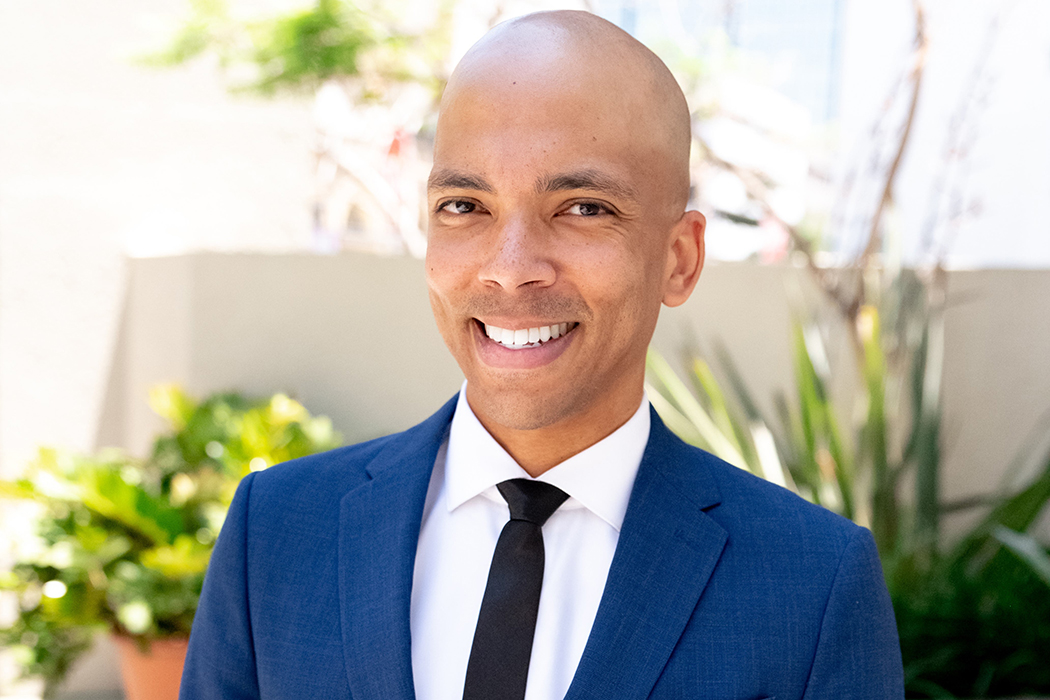
As part of his fellowship, Christopher Baidoo will examine initiatives in Massachusetts aimed at protecting children from sexual abuse in the digital world. Courtesy photo.
He’s earned a Juris Doctor and a master’s degree in social work. He’s authored six peer-reviewed papers covering topics such as the experiences of Puerto Rican youth displaced by Hurricane Maria and the impact of skin tone on sentencing in the U.S. criminal justice system. And he’s an active member of the Academy of Criminal Justice Sciences and the National Association of Social Workers.
Now, Christopher Baidoo, a doctoral candidate at the Boston College School of Social Work, can add another accomplishment to his curriculum vitae: recipient of a summer fellowship from the Rappaport Institute for Greater Boston, a research and policy center at Harvard University that encourages graduate students to spend part of their careers in public service.
For the next two months, Baidoo will team up with the Office of the Child Advocate, which works to ensure that youth receive quality care from state agencies. In particular, he will examine initiatives in Massachusetts aimed at protecting children from sexual abuse in the digital world, focusing on issues such as online grooming and exposure to inappropriate content. At the end of his fellowship, he will present policy recommendations to his supervisor to help end the sexual abuse of children online.
“It’s a good marriage of my skill set because I’m having to research laws and look at legislation,” says Baidoo, PhD’26, who studies the ways in which public policies affect marginalized populations. “But I’m also using my quantitative and social science research skills and looking at what’s been published in the academic research in this area and what works and what doesn’t work, and then ultimately making recommendations to the state about what it can do differently and borrowing things that other states have done that seem to be effective.”
Baidoo credits his academic experiences at BCSSW with helping him earn the fellowship, which was awarded to 20 students from 10 universities this year.
He says one course, Data Analytics for Social Impact, led by Professor Summer Sherburne Hawkins, taught him how to harness the power of data to solve social problems. He also points to his partnership with Assistant Professor Vincent Fusaro, who examines policies and programs that affect the economic and material well-being of low-income households in the U.S., as a formative experience that gave him the confidence to conduct original policy research.
“At my fellowship, I’m able to digest research, make sense of it in a quick way, then aggregate information from different studies to generate recommendations,” he says. “Even though I’m working on a different subject matter, the methods that we’re using are similar, so I’m able to interpret the results from the studies I’m looking at and then use that knowledge to help the agency.”
“ It’s a good marriage of my skill set because I’m having to research laws and look at legislation. But I’m also using my quantitative and social science research skills and looking at what’s been published in the academic research in this area and what works and what doesn’t work, and then ultimately making recommendations to the state about what it can do differently. ”
Baidoo might not have received this fellowship—or even found his way to BCSSW—if he hadn’t made a pivotal career decision about three years ago.
Before enrolling at BCSSW in 2022, Baidoo spent 11 years at California Western School of Law, working his way up from assistant director of admissions to chief of staff. As chief of staff, Baidoo led institutional research efforts, a position in which he used data to enhance student outcomes.
While Baidoo valued the importance of this work, he also felt a pull to make a fuller use of his academic background in law and social work.
“I was sitting on this skill set that could potentially have a big impact in the real world,” he recalls, “and I felt like I wasn’t using myself to the maximum potential.”
Baidoo began pursuing PhD programs in social work, with the end goal of becoming a professor who conducts research to drive policy change. He chose BCSSW after a careful search of top-ranked programs around the country.
“Boston College is highly ranked and has good faculty,” he says. “And I just felt like it was a good marriage for me and them and I had some good conversations with people at the School in the process.”
Following his fellowship, Baidoo plans to focus squarely on his dissertation at BCSSW. Specifically, he’ll examine how legal interventions affect fatal encounters with police and evaluate the effectiveness of these strategies in reducing racial disparities in such incidents.
Baidoo says his fellowship will help guide his work, noting that it will give him insight into how to translate complex concepts into easy-to-understand language for policymakers.
“I don’t want my research to stop with publications,” he says. “I want to be able to digest my findings into simpler terms that are understandable to legislators and policymakers who I’m trying to influence.”

